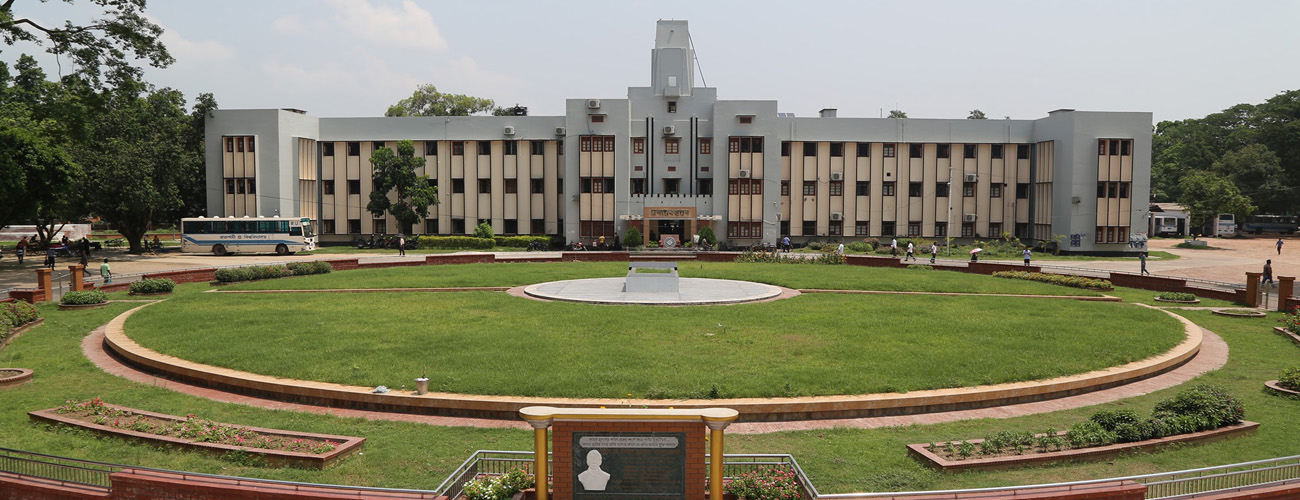Welcome to Fisheries Department
New horizon for Fisheries education in north-west Bangladesh
With a view to imparting fisheries education in the north-western Bangladesh, the Department of Fisheries was established in 2000 under the Faculty of Agriculture. The first batch of students was admitted in the 2000-2001 session. The Department offers different courses both at Undergraduate and Postgraduate levels. There are 20 specialist teachers in different fields of fisheries. The department has already demonstrated its outreach excellence through establishing linkages with the Ministry of Fisheries and Livestock, Ministry of Science and Information & Communication Technology, University Grants Commission of Bangladesh, World Fish Center, Ministry of Education, Culture, Sports, Science and Technology: MEXT (Japan), European Commission, Bangladesh Fisheries Research Forum, Asian Food Safety and Security Association (AFSA), Zoological Society of Bangladesh, National Environmental Science Academy (NESA, India) etc. for research, extension and developmental activities.
Importance of Fisheries education in Bangladesh
Bangladesh is a country of rivers, rivulets and tributaries. These water bodies abound in fishery resources. Around 60% of animal protein is supplied by the commercially important fisheries organisms which are also considered as the cheapest and richest source of animal protein. Only fisheries science can effectively assist in understanding the mechanism and thereby increase in animal protein supply through fisheries organisms. Bangladesh is one of the richest countries of the world considering the availability of fisheries resources but annual fish production is still less than the demand of country people. To meet this demand fisheries education is must through which production can be increased in an environment friendly condition. Bangladesh earns second highest foreign currency from fisheries sector by exporting fisheries products. Also considering product sources, fisheries sector is found to be the largest highest export earning sources for the country because garment raw materials are imported from foreign countries whereas fisheries products are completely of native sources. We got only 20% of the raw materials out of the total capacity of the prawn/shrimp processing factories. Therefore, fisheries education can play a vital role to expand the fisheries industries as well as to increase the export earnings as a sustainable basis. About 1.25 crore of people (10% of the country’s total population) are directly or indirectly involved in fisheries sector for their livelihood in Bangladesh. Four out of every five rural dwellers of the country are dependent to some extent on aquatic resources. No other sector is found with this sort of dependency in Bangladesh. Fisheries education can assist effectively in using the aquatic resources and human resources as well. Under the above circumstances the importance of fisheries education is felt to a greater extent to the nation with important indications like- increasing the number of fisheries graduates through different universities and increasing the research, extension and development activities through providing employment opportunities of these graduates at different government and non-government organizations, donor/development agencies, banks and private sectors. Therefore, simply to think fisheries education as an way to earn a degree or certificate is to miss its crucial role it can play in finding thousands of ways for employment generation in country and abroad.
Employment scope for fisheries graduates
- Government organizations: Department of Fisheries (DoF), Ministry of Youth and Sports, Ministry of Planning, Bangladesh Fisheries Research Institute (BFRI), Bangladesh Fisheries Development Corporation (BFDC), Bangladesh Agricultural Research Council (BARC) etc.
- Non-government organizations: BRAC, Proshika, Grameen Bank, RDRS, Banchte Shekha, TMSS etc.
- International organizations: WorldFish Center, FAO, UNDP, CARE etc.eeeeee
- Private sectors: Fish farms, hatcheries, feed mills, processing factories etc.
- Projects and Programs: GoB funded different projects and programs, International donor (DFID, USAID, DANIDA, EC etc.) supported different projects and programs.
- Others: Bangladesh Krishi Bank, Rajshahi Krishi Unnayan Bank, Sonali Bank, Agrani Bank etc.

